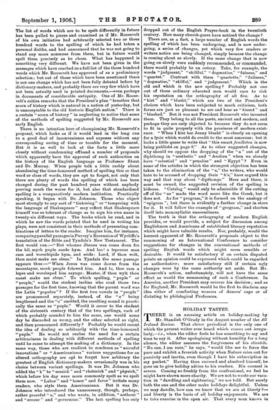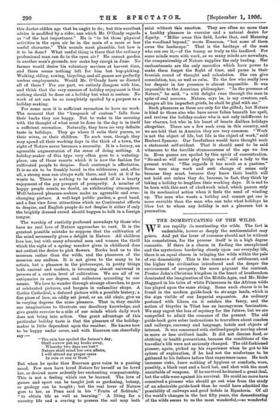HOLIDAY TASTES.
THERE is an amusing article on holiday-making by Mr. Standish O'Grady in the August number of the All Ireland Review. That clever periodical is the only one of which the present writer ever heard which comes out irregu- larly,—i.e., when the editor feels he has something to say and time to say it. After apologising' without humility for a long silence, the editor assumes the forgiveness of his clientele. "No one, I am sure," he says, "would like me to force the pace and exhibit a feverish activity when Nature cries out for passivity and inertia, even though I have his subscription in my pocket." Having thus excused and absolved himself, he goes on to give holiday advice to his readers. His counsel is severe. Coming so freshly from the confessional, we feel he might have shown more charity. We are not to waste our vaca- tion in "dawdling and sightseeing," we are told. But surely both the one and the other make holidays delightful. Unless we may dawdle, how can we know that we are at liberty F- and liberty is the basis of all holiday enjoyments. We are to take exercise in the open air. That every man knows in "The rain has spoiled the farmer's day, Shall sorrow put my books away, Whereby two days are lost P Nature shall mind her own affairs, I will attend my proper cares
In rain or sun or frost."
But when he spoke thus Emerson gave voice to a passing mood. Few men have loved Nature for herself as he loved her, or desired more ardently her enchanting companionship. This is not a feeling which can be learned. The love of games and sport can be taught just as gardening, botany, or geology can be taught ; but the real lover of Nature goes to her, as Penn said in his "Fruits of Solitude," "to obtain life as well as learning." A liking for a country life and a craving to possess the soil may both this doctor-ridden age that he ought to do; but this excellent advice is modified by a rider, one which Mr. O'Grady regards as "of the last importance." He is "to let those physical
activities in the open air be in the main of a more or less useful character." This sounds most plausible, but bow is
it to be done ? What useful thing is there that the ordinary professional man can do in the open air? He cannot garden in another man's grounds, nor make hay except in June. No farmer would desire his voluntary services at harvest time, and there seems nothing left for him but hop-picking. Walking, riding, rowing, bicycling, and all games are perfectly useless employments. Would Mr. O'Grady have us discard all of these ? For our part, we entirely disagree with him, and think that the very essence of holiday enjoyment is that nothing should be done on a holiday but what is useless. No work of art can be so completely spoiled by a purpose as a holiday-making.
For some men it is sufficient recreation to have no work. The moment that the "knapsack of custom" falls from their backs they are happy. Not to wake in the morning with the thought of what must be done in the day is in itself a sufficient recreation. Naturally, they have no very definite taste in holidays. They go where it suits their purses, or their wives, or their children. To such men, though they may spend all their working days in the thick of a town, the sight of Nature never becomes a necessity. It is a luxury, an agreeable augmentation of the sense of doing nothing. A holiday-maker of this type very often goes to a watering- place, one of those resorts which it is now the fashion for cultivated people to despise. Such contempt is affectation. It is no sin to be frankly bored in the wilderness; and, after all, a strong man can always walk there, and look at it if he wants to. There is nothing to be ashamed of in a hearty enjoyment of the gay prospect of prosperity. A number of happy people create, no doubt, an exhilarating atmosphere. Well-behaved pleasure-seekers make an agreeable and ever- changing picture. A well-kept public garden, a good band, and a fine view form attractions which no Continental affects to despise, and English people do not despise it either if only the brightly dressed crowd should happen to talk in a foreign tongue.
The worship of rusticity professed nowadays by those who have no real love of Nature approaches to cant. It is the greatest possible mistake to suppose that the cultivation of the mind necessarily gives a delight in Nature. All children love her, but with many educated men and women the thrill which the sight of a spring meadow gives in childhood does not outlast the desire to pick flowers. Books lead us to the museum rather than the wilds, and the pleasures of the museum are endless. It is not given to the many to be artists, but a pleasure in the picturesque, in pretty things both ancient and modern, is becoming almost universal in persons of a certain level of cultivation. We are all of us antiquaries in our degree, and collectors according to our means. We love to wander through strange churches, to gaze at celebrated pictures, and bargain in unfamiliar shops. A Gothic Cathedral, a defaced picture with a possible history, a fine piece of lace, an oddly set jewel, or an old chair, give us in varying degrees the same pleasure. That is, they enable our imaginations to illustrate our desultory knowledge, and give gentle exercise to a side of our minds which daily work does not bring into action. One great advantage of this particular holiday taste is that the pleasure of the holiday- maker is little dependent upon the weather. He knows how to be happy under cover, and with Emerson can cheerfully say :--
exist without this emotion. They are often no more than a healthy, pleasure in exercise and a natural desire for dignity. "Miller owns this field, Locke that, and Maiming the woodland beyond," wrote Emerson, "but none of them owns the landscape." That is the heritage of the man who can see it,—of the tramp as truly as the landlord. For some minds worn with work, as so many minds are nowadays, the companionship of Nature supplies the only healing. Her enchantments are the only narcotics which have power to make them forget the flight of time, and pause in their feverish round of thought and calculation. She can give consolation, too, as well as calm. To the few who really love her despair in her presence is almost impossible. It was impossible to the American philosopher. "In the presence of Nature," he said, "a wild delight runs through the man in spite of real sorrows. Nature, says he, is my creature, and, maugre all his imperfect griefs, he shall be glad with me."
Such pleasures as these are only for the gifted; but Nature is kind to those also who have never fallen beneath her spell, and revives the holiday-maker who is not only indifferent to her charms, but who in his heart of hearts dislikes holidays altogether. There are a few such even in this country, and we are told that in America they are very common. "Work is not the object of life, but life is the object of work," said Herbert Spencer. Our forefathers would have thought such a statement self-evident. That it should need to be said witnesses to the terrible strenuousness of the age we live in. Even games are spoiled by this spirit of concentratiou. 4` So-and-so will never play bridge well," said a lady to the present writer. "She regards it too much as a pastime." Some men stop work and seek change of scene only because they must, because they know their health will not hold out unless they do, because, in fact, they think by taking a holiday to lengthen their working days. It is sad to be born with this sort of clockwork mind, which pauses only in its mechanical action when it feels the need of winding up. The man who wants a holiday and cannot get one is more enviable than the man who can take what holidays he likes but to whom any holiday is not a pleasure but a precaution.



































 Previous page
Previous page